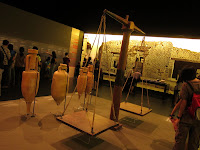Lesley-Anne' school imposes a more rigorous requirement, namely 100 hours of CIP over four years. Since the school regularly organises CIP events for the students, the requirement is not as daunting to complete as it appears.
That is, until Lesley-Anne brought home a form just before school closed for the holidays. It stated that kids from the SBGE classes had the additional requirement of completing 30 hours of self-initiated CIP (ie not organised by the school) before June 2011.
Lesley-Anne was a little miffed that this requirement was only applicable to SBGE students ("you mean only gifted kids have to do community service?") but she accepted it with grace since she is all for giving back to society anyway. At first, we thought nothing of it, maybe she could hook on to some organisation and volunteer her time during the holidays to complete the hours.
However, when she began to check online, she realised that the task was much more challenging than it appeared. First of all, you apparently can't just volunteer your time, you may only sign up for available opportunities that organisations post online, and these have to be organisations recognised for CIP. Since she was given the form so late, many opportunities during the holidays have been fully booked (I'm guessing by more clued in students desperate to clear their CIP hours!) To add to the complication, we discovered that most organisations don't accept volunteers under the age of 15.
Faced with this dilemma, there was a mad scrambling at home - Kenneth and I scouring the web for opportunities while Lesley-Anne was on the phone with her friends in the same predicament, asking if they had any lobang. Come on, I'm all for community service but when you impose a requirement that has so many administrative hurdles, it's slightly ridiculous.
Anyway, one of the opportunities we managed to find was the Memory Walk in aid of Alzheimer's patients. It was especially meaningful for Lesley-Anne since her late grandfather suffered from Alzheimer's.
 So Lesley-Anne and two of her other friends signed up for the event, sacrificing their sleep-in time to make it down to the Marina Barrage by 6.30am on a Sunday morning. Kenneth too, had to wake up early to drive the girls down. When the child does CIP, so does the parent!
So Lesley-Anne and two of her other friends signed up for the event, sacrificing their sleep-in time to make it down to the Marina Barrage by 6.30am on a Sunday morning. Kenneth too, had to wake up early to drive the girls down. When the child does CIP, so does the parent!Initially, the girls were assigned to hand out surveys and coupons but later, they were tasked with manning the Milo van. Oooh... much more fun, methinks!
Here are the three friends, raring to serve Milo!
 The walk attracted a huge turnout. There were some 5,000 registered participants, in fact when Kenneth tried to sign up for the walk, he was turned away as it was full. There were many booths and activities at the Marina Barrage for the post-walk session, including mahjong tables, puzzles etc. I think the biggest draw was the goodie bag though - typically Singaporean!
The walk attracted a huge turnout. There were some 5,000 registered participants, in fact when Kenneth tried to sign up for the walk, he was turned away as it was full. There were many booths and activities at the Marina Barrage for the post-walk session, including mahjong tables, puzzles etc. I think the biggest draw was the goodie bag though - typically Singaporean! M
M eanwhile back at the Milo van, the volunteers were busily dishing out cups of Milo to snaking queues (not in picture, this was taken before the event started). And here's where you see ugly Singaporeans emerge from the woodwork. These are some of the stories Lesley-Anne shared after the event.
eanwhile back at the Milo van, the volunteers were busily dishing out cups of Milo to snaking queues (not in picture, this was taken before the event started). And here's where you see ugly Singaporeans emerge from the woodwork. These are some of the stories Lesley-Anne shared after the event.10 mins after walk started, an elderly lady zipped by to ask for Milo. Lesley-Anne's friend told her, "Auntie, you go for walk first", to which she replied, "walk already". Wah, 3.4km in 10mins - she must be a super sprinter. Or maybe she meant walking from the starting line to Milo van.
As expected, there was a high demand for Milo and it didn't help that there were the expected kiasu ones who aggravated the crowd situation by repeatedly queuing and asking for multiple cups for imaginary friends.
This particular friend of Lesley-Anne I thought was very garang - she would remember their faces and had no qualms about questioning them, "Three cups? One for you, one for your friend, who's the other one for?" or "Next time bring your friend!" One lady didn't like being interrogated over her repeated requests for multiple cups and muttered something about "the education system nowadays, students so yaya."
One person even brought his own water bottle and asked to fill it with Milo. Aiyoh, I know the Milo from Milo van is very nice lah, but still... Worse, I heard some of the volunteers were called "idiots" and "so slow" by impatient queuers. It didn't happen to Lesley-Anne but it upsets me to hear volunteers being verbally abused. I know it happens a lot with people like social workers and nurses. It's just wrong, when those who are trying to help others have to put up with this sort of mean spiritedness.
Anyway, I think this was a good experience and hopefully, through CIP, Lesley-Anne will be exposed to different forms of community service which can enrich her character.









































